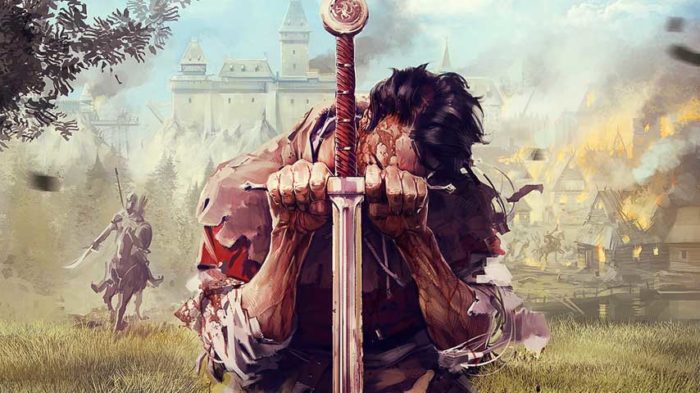Kingdom Come: Deliverance is an ambitious game. It boldly aims to stand apart from a well-trodden genre of fantasy RPGs by removing spells, dwarves, and dragons, opting instead to realize an authentic European Middle Ages setting. To that end, every inch of its intricately crafted open world has been designed with realism and historical accuracy in mind. But the absence of fantasy elements certainly hasn’t made the experience any shallower. On the contrary, the inclusion of various survival mechanics, ultra-realistic sword combat, and the sum of hundreds of tiny but impressive details in the name of authenticity have made it staggeringly complex. Sometimes, overwhelmingly so, to the point that the developer’s rigorous commitment to realism often frustrates, especially in combination with a host of technical issues and one or two poorly executed gameplay systems. Yet in the end, despite it ultimately feeling slightly like a case of missed potential, there’s a charm to this experience and a level of immersion virtually unparalleled in video gaming that makes it worthy of a spot in any RPG fan’s collection.
On paper, the story of Kingdom Come: Deliverance is just another video game tale of revenge. But what makes this particular rendition of that familiar plotline special is that it manages to achieve its impact without blowing the scope to a ludicrous scale. Rather like its modestly sized but superbly detailed open world, the plot is a zoomed in affair that concerns itself more with presenting an authentic slice of lowborn medieval life rather than a save-the-world grandiose spectacle. That it manages to succeed in this manner is thanks, in part, to Henry, the game’s likable main protagonist, and an interesting cast of supporting NPCs, but mostly due to some superb writing that isn’t afraid to mix the serious with the whimsical. The story of Kingdom Come: Deliverance really is a breath of fresh air in a genre that is often criticized for repetition and tedium.
But it certainly takes its time to get going. The prologue alone is a two or three-hour experience, and you’ll find yourself doing tutorials well beyond that number. Not that there’s many of them, mind you. The game affords very little direction to players in the opening quarter, and since you’re almost straightaway faced with juggling Henry’s rampant appetite and tendency to fall asleep on the job, there’s a steeper learning curve and much more time spent trying to get a grip on all of its survival and role-playing systems. Money, or lack thereof, is another major issue that slows your ability to make headway early on. Henry is completely broke from the start and basic resources and weapons are hugely expensive.
Ultimately, all of this means that long before Kingdom Come: Deliverance reveals its best qualities, it’s easy to get bogged down trying to get the ball rolling on character progression and understanding how to micromanage each gameplay mechanic. Most RPGs have a bit of a break in period, but Kingdom Come: Deliverance is a special case, and it’s easy to imagine players being off-put before things really get going.
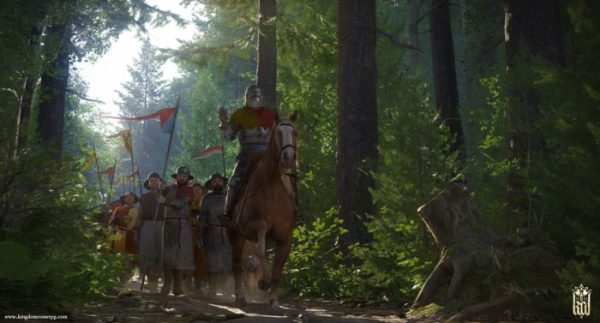
When it does finally open up, however, it’s hard not to spend time marveling at the spectacle of its open world. You can tell there’s been a hugely passionate and dedicated amount of effort poured into animating the aesthetic of Kingdom Come: Deliverance. There’s attention to detail everywhere, from the period-accurate attire of village-folk to some of the most beautiful wilderness I’ve ever seen in a video game.
Unfortunately, though, it doesn’t run nearly as well as should do on PS4. Lower resolution textures in comparison to the PC version are to be expected, but there’s a chop to its framerate on console and a woefully short draw distance that feels rough and unoptimized. Worse still, assets often load painfully slowly, which means you’ll sometimes walk into a village full of smooth-walled square and triangle houses before the console catches up and loads the missing detail. It’s the sort of performance I’d forgive in a beta build, but it’s harder to swallow in a $60 full release. Despite that, though, parts of Kingdom Come: Deliverance are undoubtedly gorgeous, and I found myself frequently gawking at its many forests or sitting in a taverns playing dice with the locals.
Actually, Kingdom Come: Deliverance isn’t a game that likes or wants you to play it quickly. Beyond juggling Henry’s energy, nourishment, and comfort, he can’t carry very much, which can make inventory management a real battle. Fast traveling and fast-forwarding the time of day aren’t instantaneous actions, either – they require you to watch a timer click down slowly, and as they do, Henry’s stats drop over time, meaning that each use requires a level of pre-planning. In fact, several core mechanics involve a countdown timer that can’t be skipped for that same reason. It’s all in the name of immersion and realism, of course, but it’s not going to be everyone’s cup of tea, and even the most fanatic fans of survival and complex RPGs won’t enjoy having to spend ten minutes of every hour of gameplay watching a timer screen.
Yet there’s no doubt Kingdom Come: Deliverance is an incredibly immersive role-playing experience. It’s been designed as a believable world to exist in, rather than a blockbuster to rush through and box-check objectives. You’ll even need to spend time learning to read before you can benefit from special scriptures that enhance your abilities – and even once you’re literate, reading books requires time and energy. It sounds like a chore, but it’s a brilliant way of gifting additional stat bonuses to the player over time as well as adding to the sense of immersion.
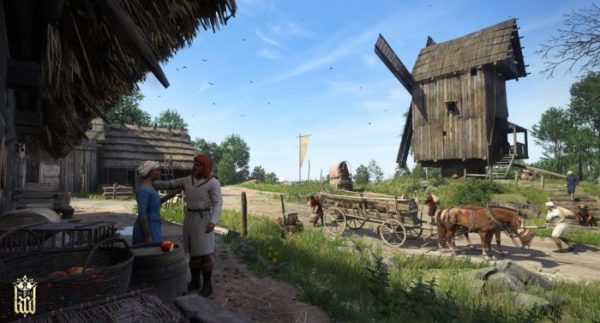
The skills and progression in Kingdom Come: Deliverance are slightly reminiscent of Skyrim, except here there’s absolutely no class system. Each skill has perks that can be unlocked, and skills only level when players actually engage in the use of that particular action, rather than according to binary menu choices. So to be a skilled archer requires you to actually use your bow, and not simply add a skill point into a stat. It feels appropriate in the context of the emphasis on realism, and it’s a refreshing departure from skill trees and class selections that have become a default blueprint for modern RPGs. Here, character builds are chosen simply by playing to your preference, and the game does genuinely support aggressive, diplomatic, and stealthy styles.
Unfortunately, stealth is somewhat spoiled by the lockpicking mechanic, which is totally broken on consoles. The small minigame in which players have to find a sweet spot with one stick and rotate the lock with the other has clearly been designed to be used in tandem with the precision of a mouse control system. With the analog sticks, it’s absurdly difficult and so unenjoyable that I all but ignored it for the entire game. To have an entire mechanic defunct on two major platforms is surely a huge blunder from Warhorse Studios’ Q&A team. The developer has assured players a patch is on the way, but two weeks after launch is an awfully long amount of time to have to wait.
The promise of a realistic sword combat system was perhaps the biggest draw for early backers of Kingdom Come: Deliverance’s crowdfunded support. Warhorse has worked tirelessly to innovate a system that authentically replicates the relationship between weapon and plate armor. Every duel is a tactical battle of reflexes and precision, as enemy weak points need to be targeted and exposed to various combinations of thrusts and cuts. It’s convincing, certainly, but not all that fun to play.
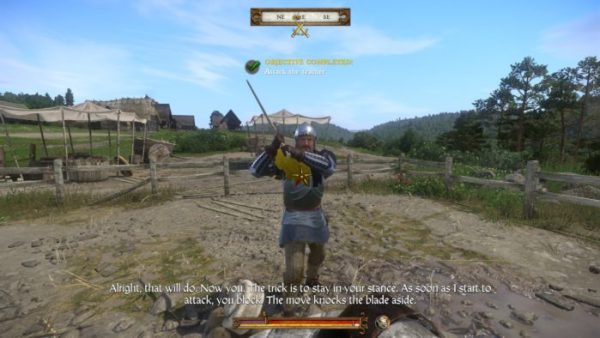
Don’t get me wrong, I appreciate the strategy involved with each encounter and I happen to have an interest in historical weaponry myself, but played out in such a deliberate and sluggish manner, combat is void of excitement and satisfaction. Each swipe or block is measured and cumbersome rather than weighty and exhilarating, and features such as the clinch system often feel out of your control. Things get easier and more empowering as players level up, but even then, most combat encounters boil down to waiting for an almost QTE-like perfect block opportunity to tire out your opponent before striking back. And the system really doesn’t work with multiple enemies due to its lock-on nature. I would so much have preferred the ability to position blocks and aim attacks without being forced into a one versus one system, as one can in the Mount and Blade series.
The combat is undoubtedly strategic, though, and it’s a nice change of pace to have an RPG employ a skill-based system rather than simply tying power to level stats. There’s also plenty of replayability and depth thanks to huge amount of different combinations of strikes to learn and different weapon-types to master. I’m just not sure that I wouldn’t have conceded a little ground on the principles of authenticity for a more fun factor. The same could be said for archery, too, which doesn’t just ask players to compensate for breathing but is also void of a crosshair and makes each pull of the bow painfully time-consuming. There’s little more frustrating than standing four feet from a hare and missing it entirely, equally so four feet from an enemy who then comes and clobbers you over the head before you’ve had a chance to even load another arrow.
In the end, though combat was a core principle the game has been built around, it isn’t Kingdom Come: Deliverance’s strongest quality. That’s disappointing, but there’s so much else to be enjoyed in this RPG that it isn’t enough to spoil the experience. As you’d expect from a game as detailed as this, there’s a wealth of content to enjoy off the beaten track of its main narrative. But true to its slightly obtuse figure-it-out-for-yourself design, you won’t really know that unless you really take the time to explore and interact with the world. Side quests and points of interest are there in abundance but don’t overwhelm you with huge volumes of map icons. Instead, you’ll have to seek them out yourself.
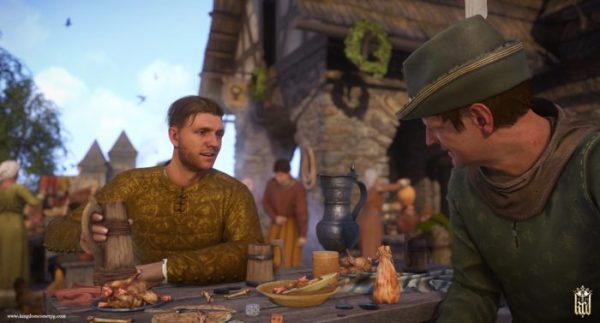
I can’t tell you how refreshing it is to not feel obligated to box-check dozens of fetch quests, collectibles, and question marks. Yet the content is there to be stumbled upon in chance encounters, which is so much more special. Ultimately, after 50 hours of Kingdom Come: Deliverance, I feel compelled to go back and play more not because I know there are twelve side quests, two activities, and three bandit camps left to check off, but because I know that out there somewhere there are stories waiting to be explored and discovered.
I’m loathed to sting Kingdom Come: Deliverance too heavily for its occasional bugs and glitches, which certainly do affect gameplay. Thankfully, at no point were these too overwhelming or game-breaking, but it’s certainly a little rough around the edges. My mount, Pebbles, occasionally spawned standing on his head, and NPCs sometimes drop halfway into the ground or disappear entirely, but I’ve seen the same from plenty of other AAA open world RPGs. What is a huge upset, though, is the lackluster performance on console and poor implementation of the lockpicking mechanic. As a result, all too often Kingdom Come: Deliverance feels more like an unfinished draft rather than a polished final edit, especially in combination with the occasional glitch.
In the end, however, despite the flaws, there’s enough charm, compelling storytelling, and immersive atmosphere to see it through. There’s a distinct passion project feel to Kingdom Come: Deliverance is unique and special – cobbled together somewhat, but engrossing and lovable. Yet still, I’m not sure Warhorse Studios bit off slightly more than it could chew. I don’t think the experience would have been any less for dialing down the commitment to authenticity or reducing the scope of its survival mechanics both in the name of performance and accessibility. It ends up being a very niche RPG that won’t endear itself to many gamers. For others, it might just resonate on a level that pushes it to the territory of those one-of-a-kind, truly memorable gaming experiences.
Score: 3.5/5 – Fair
Pros
| Cons
|
For more information on how we review games, check out Twinfinite’s review policy here.

